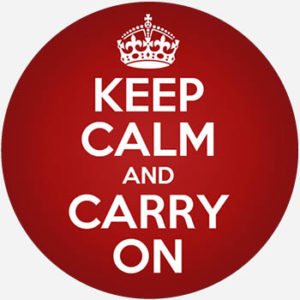

In late 1939 after the outbreak of the war, the MOI was appointed by the British Government to design a number of morale boosting posters that would be displayed across the British Isles during the testing times that lay ahead. The Ministry of Information was formed by the British Government as the department responsible for publicity and propaganda during the Second World War. Want to know more? Our Emotional Intelligence one-day training programme – available in-house – will provide you with practical tools and techniques to manage your emotions at work, feel confident and motivated in challenging situations, and maintain a positive emotional balance.So what is this Keep Calm and Carry On thing all about then? Try different strategies, and find the one that works best for you. At work it is not OK to simply react to feelings in an unproductive way. It’s OK to feel bad at times, and the best remedy is to take some form of control and take action. And remember, just because something is out of your control, this doesn’t mean your feelings are not legitimate. Surround yourself with loved ones, talk it out with a friend, take time out to spend with the people that matter the most. Stay healthy to increase your resilience. This is why it is really important to look after yourself. When we are tired, worn out or busy these triggers will often take an even firmer grip on us, making it hard to step back and manage them.

Focus on what’s important, and don’t attempt to do everything You may need to accept that sometimes ‘good enough’ really is good enough. Try and focus on learning – what can you do differently next time? What are the positives you can take from this situation? Also, perhaps you need to review your standards – being practically perfect at all times just isn’t reasonable. Wallowing in self-pity, or beating yourself up is not productive. Making mistakes, getting things wrong or not delivering the winning pitch –can all cause bitter disappointment and unnecessary levels of self loathing. Sometimes the cause of worry or frustration is ourselves. Try reframing the issue – are you going to be worried, angry or upset about it tomorrow, next week, next month? What about next year? Looking at the bigger picture can help keep things in context. This means you need to find a way to accept what’s happening and move on. You can only ask other people to change their behaviour – you can’t make them do it. There are of course going to be times when having a talk doesn’t work. If it’s someone you manage, maybe you can suggest setting up a regular meeting instead. If someone constantly interrupts you with ‘urgent’ things (that aren’t), explain that this knocks you off track. If someone talks loudly, explain that it makes it harder for you to concentrate and ask him or her to speak a bit more quietly. Focus on facts, and how what they are doing impacts on you – try not to make things personal. In that case, you need to deal with it by taking them to one side and asking them to change their behaviour. Ok, so sometimes avoiding a co-worker just isn’t possible, and you are expected to work well with all of your colleagues. Or if a person you’re not too keen on keeps trying to distract you with idle chit chat, try moving seats and putting some distance between you. If you’ve identified a trigger, try to avoid it.Īt its most basic, if you’re irritated by having to queue for the lift – and you’re physically able – take the stairs. In our Emotional Intelligence training we ask people what coping techniques they have developed. So, in order to get calm, keep calm, and move forward in a productive and healthy way, we need to find a way to handle these triggers.
Stay calm carry on professional#
At an adult, professional level we know that reacting and allowing these emotions to take over doesn’t look good – and is unlikely to further any career prospects. And they are unhelpful, unproductive and get in the way. These sometimes overwhelming feelings are the result of people or events triggering an emotional response, and we all have different triggers. You know the ones – where you feel the prickle of anger or upset, surges of frustration or even crushing levels of disappointment. We’ve all had bad days – and bad interactions with other people.
Stay calm carry on how to#
Bad day? How to control your responses, and not let your emotions control you.


 0 kommentar(er)
0 kommentar(er)
